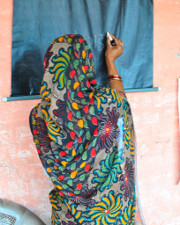S. Sudan (WAS/MNN) — South Sudan's development since its formal split from Sudan in July 2011 hasn't gone the way people hoped.
Rather, progress seems to have been inhibited by tribalism. Bruce Smith, president and CEO of Wycliffe Associates*, commented, "I think it's a pretty unpredictable and uneven process. In some areas, things are going well; in other areas, the tensions continue to boil over."
An already impoverished nation, the activities of armed groups in Jonglei, Upper Nile, and Unity states have further destabilized the region, threatened the civilian population, and risked spillover to other countries.
New tensions are emerging from old wounds. That was further evidenced by the delay of the long awaited national reconciliation conference. Leaders from South Sudan say Khartoum has showed no interest in the reconciliation process. The meetings were to address insecurity, corruption, accountability, and transparency as well as the challenges in development. Organizers rescheduled the conference for June 1, 2013.
Smith says one of the major challenges in South Sudan has been the influx of international assistance. He explains, "It doesn't sound like that would be a challenge at first, but with a limited infrastructure, limited housing, and limited ground transportation, all of that has been overwhelmed by the arrival of international aid from governments and from international organizations."
The end result is that the cost of everything in South Sudan has been skyrocketing, Smith notes." You can't find a place to lease or to rent. There are no hotel rooms available. Gasoline is scarce because there are so many vehicles. Diesel is scarce because so many vehicles are purchasing it."
Yet, despite uncertainty and challenges surrounding the Bible translation teams in South Sudan, Smith says they are emboldened rather than discouraged. "In South Sudan, there are about six active language programs right now that have been changing of course, since South Sudan split from the North a couple of years ago. So, [that's] six in progress right now, and perhaps as many as 30 [with] imminent needs that have been identified and need translation to begin."
Smith says, "In Juba–the growing capital of South Sudan, Sudanese Christians are anxious to put their new-found religious freedom to immediate use."
Comparatively speaking, when compared to the last 30 years of what is now South Sudan, this period is relatively peaceful, Smith adds. That lends itself to both optimism and prayer. "Having Scripture in their languages actually reinforces both of those things because it reminds them of God's care and concern for them personally, and as groups, it gives them a reference point to speak into their communities from God's perspective that they wouldn't have otherwise."
It's a large population of people–almost a million people–in South Sudan that are without Scripture.
Smith says the teams could use prayer. So far, opposition and unrest "have not impacted our translation teams, and we're glad to see that they're able to continue moving forward."
However, they are asking for prayer cover anyway. The projects that are ongoing need time to be completed. "They're all working on the New Testament. Some are quite far, quite well into the translation, getting close to the final checking and getting ready to publish. Others are at the beginning, so it's sort of an uneven timeline. But typically, translations that are begging to be done by the local community are taking w anywhere from six to ten years to complete."
Recently, a group of Christian pastors attended special meetings held by tribal leaders of a hostile religious group in South Sudan. The meetings were designed by the tribal leaders to win more converts to their faith. The pastors brought along portions of the New Testament that had been translated into the language of the tribal leaders, and because the Scriptures were in the leaders' language, they accepted them and also requested copies to take home.
God used that moment to advance His Gospel even though it was planned and organized by a religious group in opposition to Christianity. Now an entire group of people will have hope for eternity.
Wycliffe Associates hopes to see additional opportunities like this through the acceleration of Bible translation projects in South Sudan. Smith says, "The thing to pray for, of course, is peace and stability for the people that are there. Pray that the progress of Scripture will be an encouragement to the Christian communities that are there, that they'll look to God for their hope and for their encouragement, and that the financial situation will somehow stabilize."
*Wycliffe Associates partners with nationals, mother tongue translators, staff, volunteers, and supporters to direct and fund these efforts, as well as provide logistics, networking, and technical support. Through a growing global network, Wycliffe Associates is striving to overcome local limitations of time and resources to achieve the goal of beginning the translation of God's Word in every remaining language that needs it by 2025.

